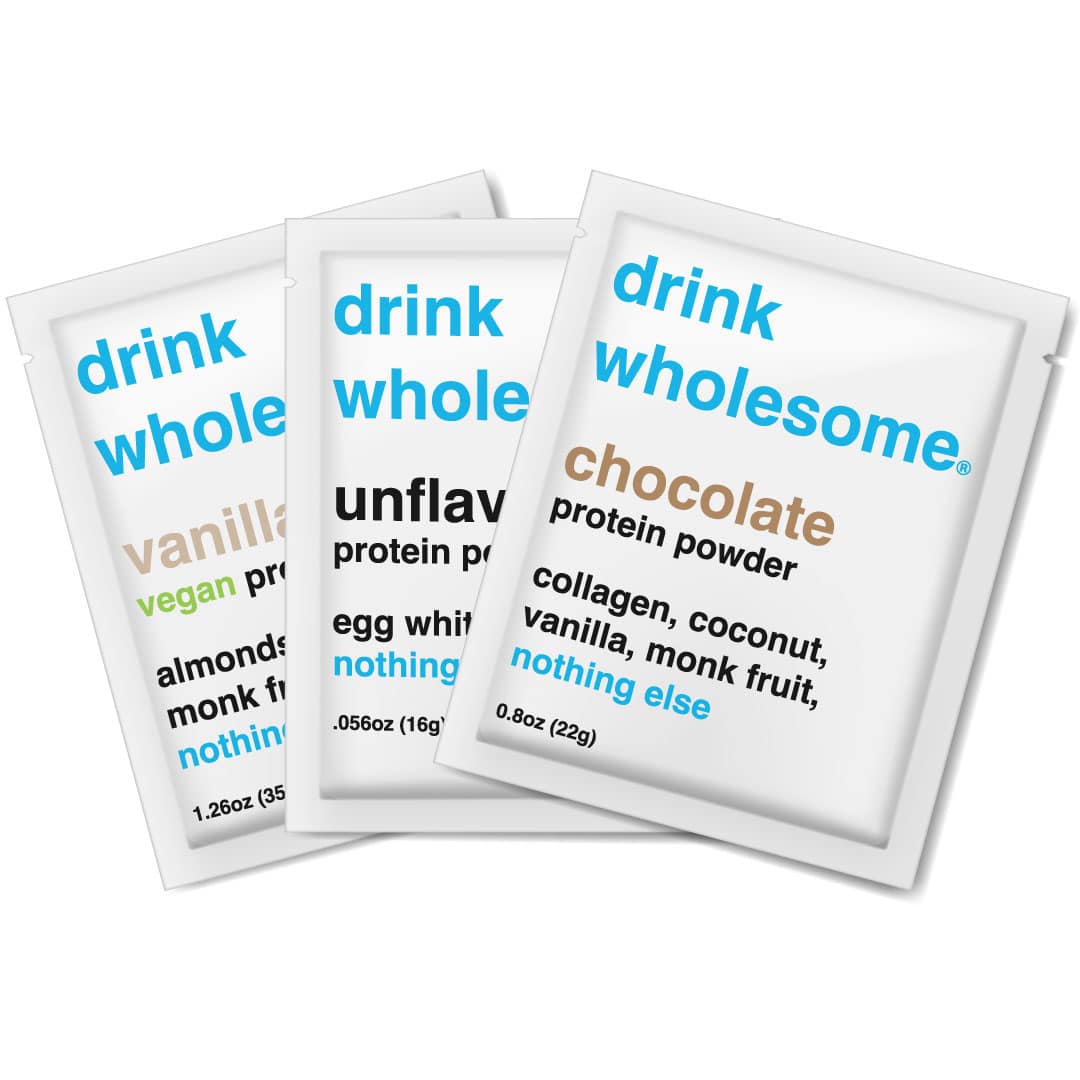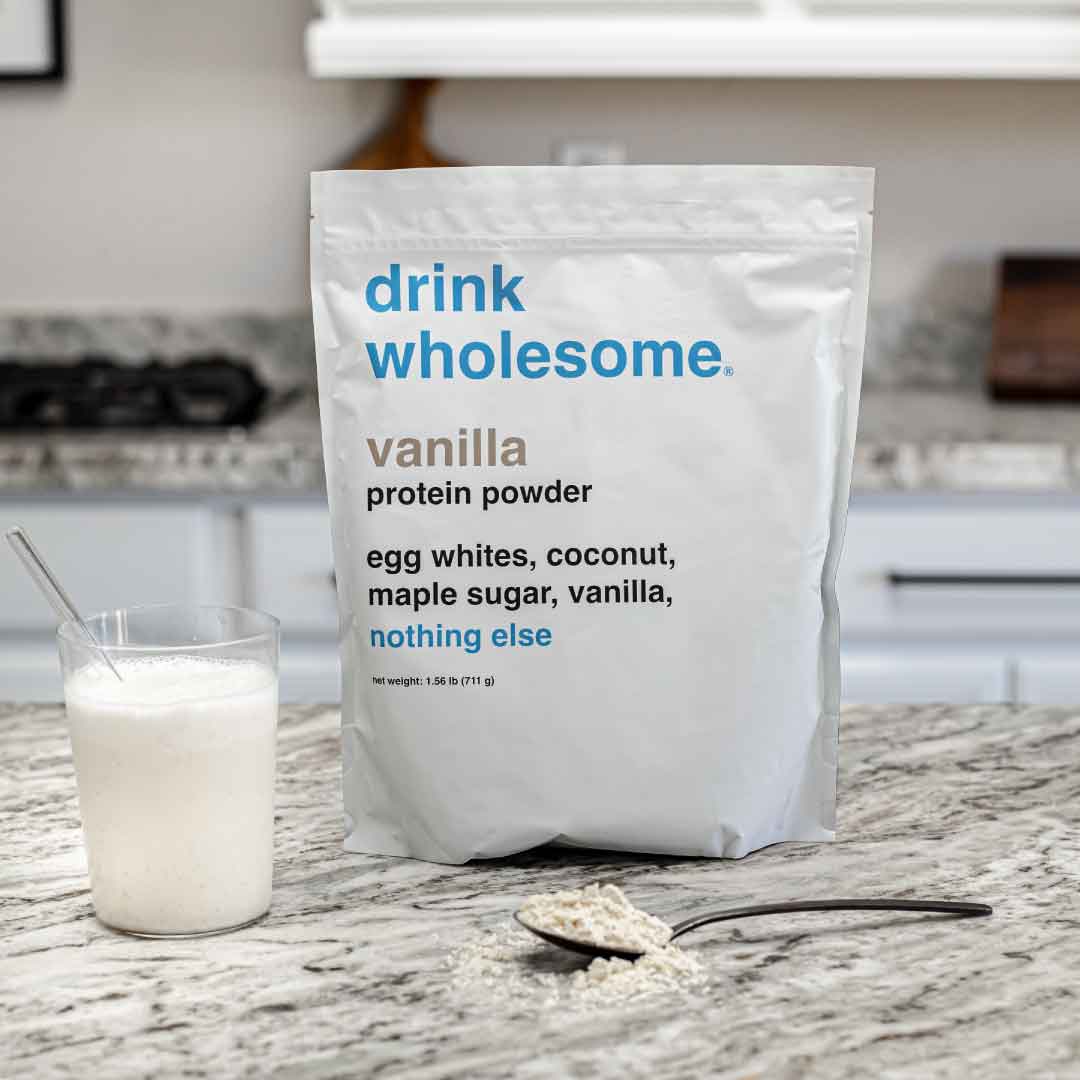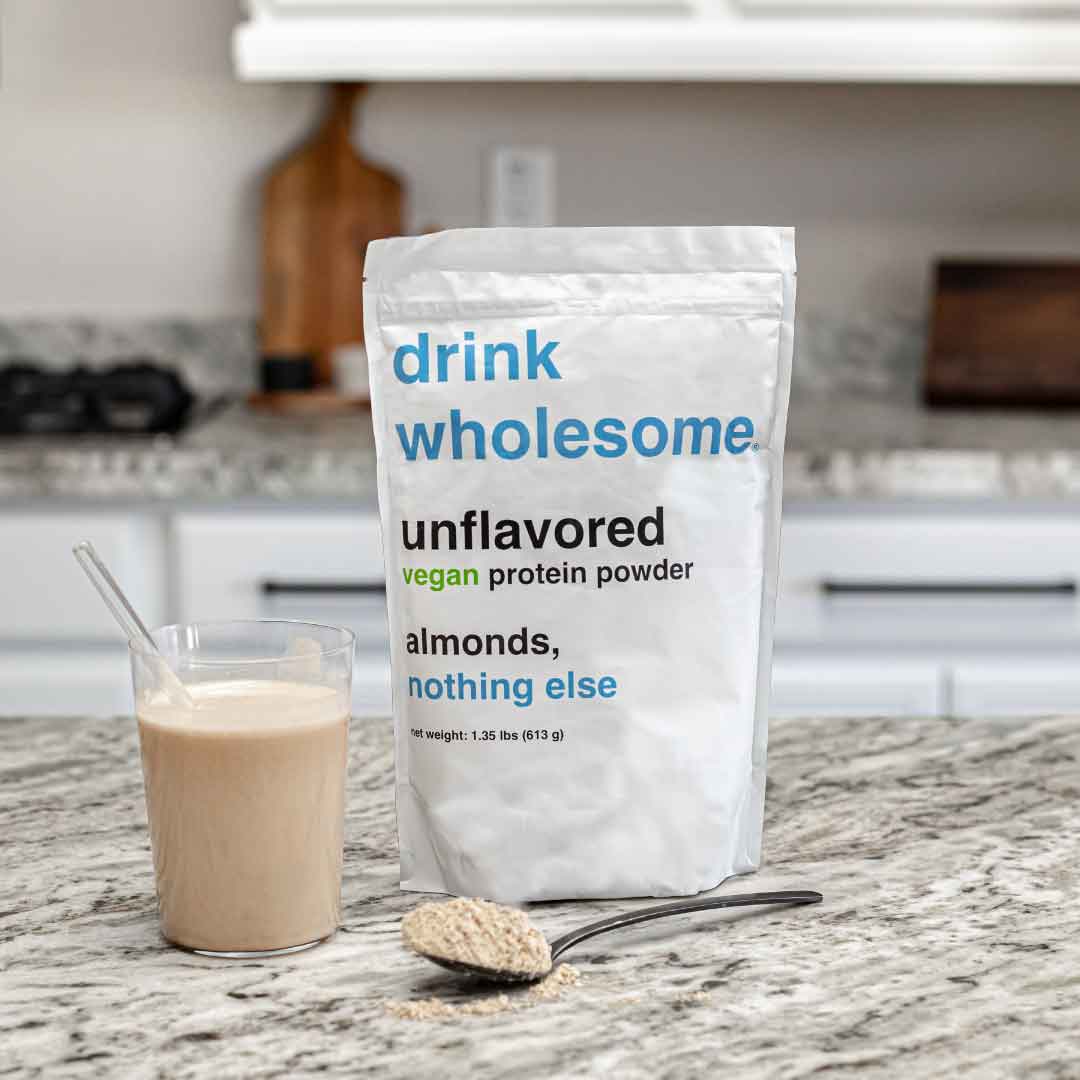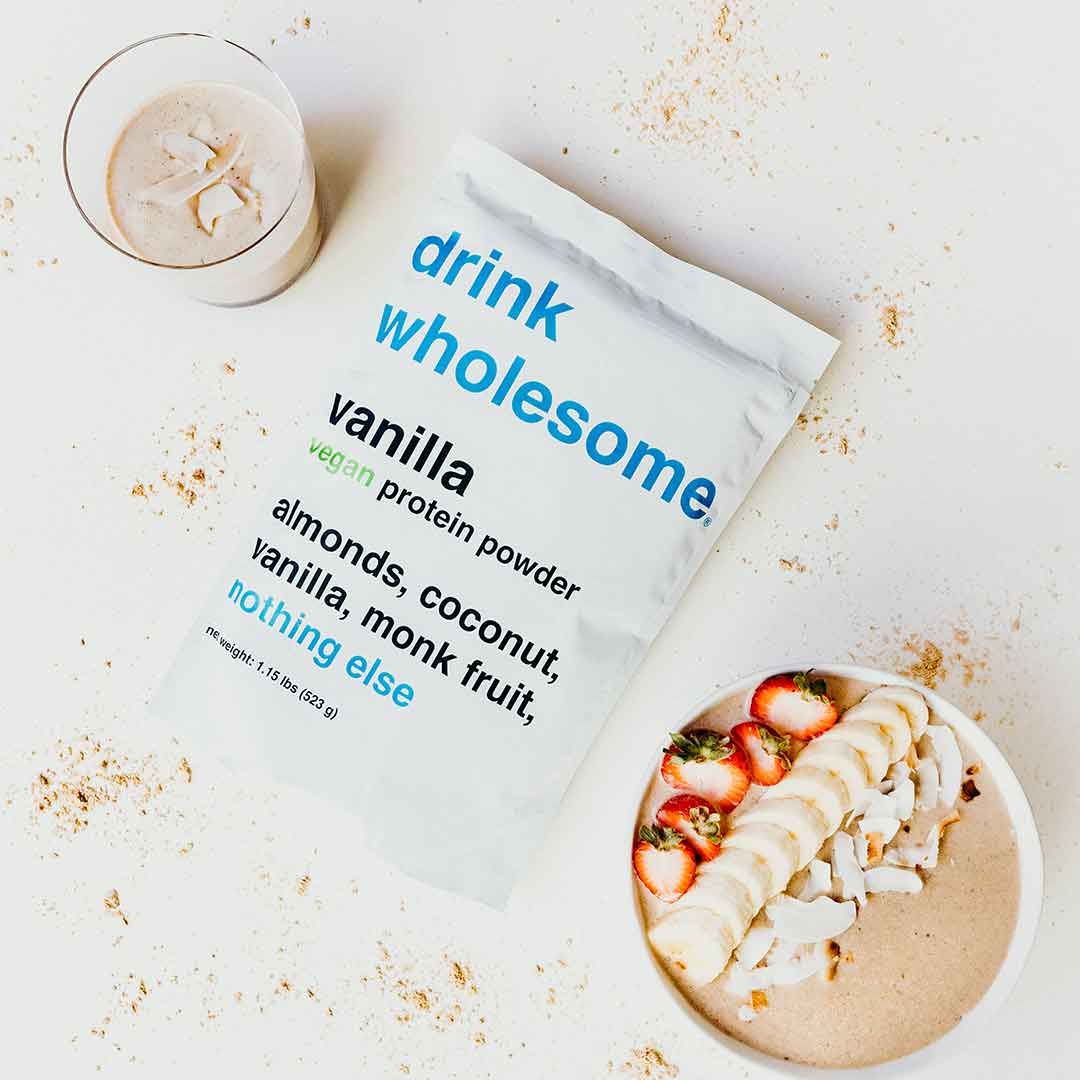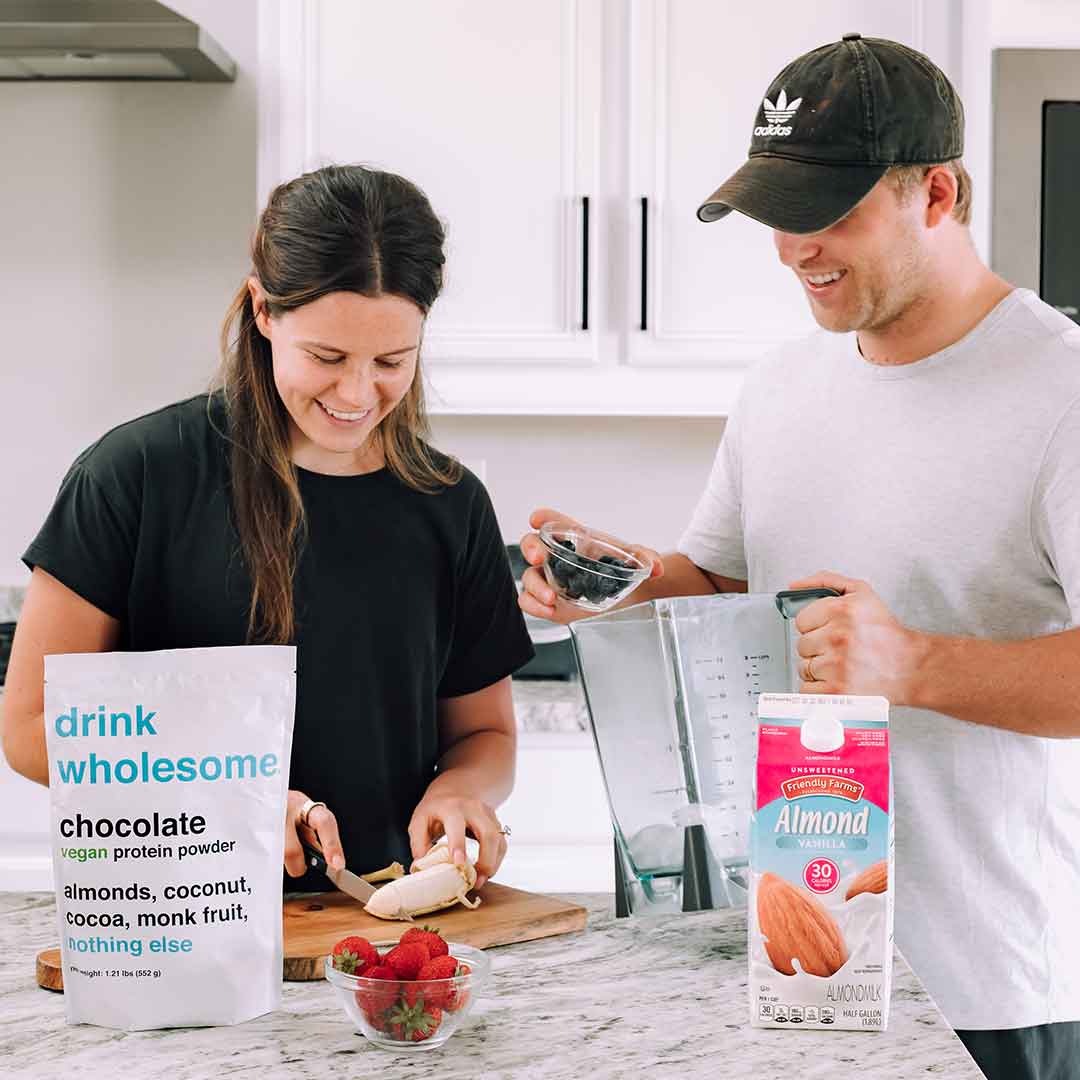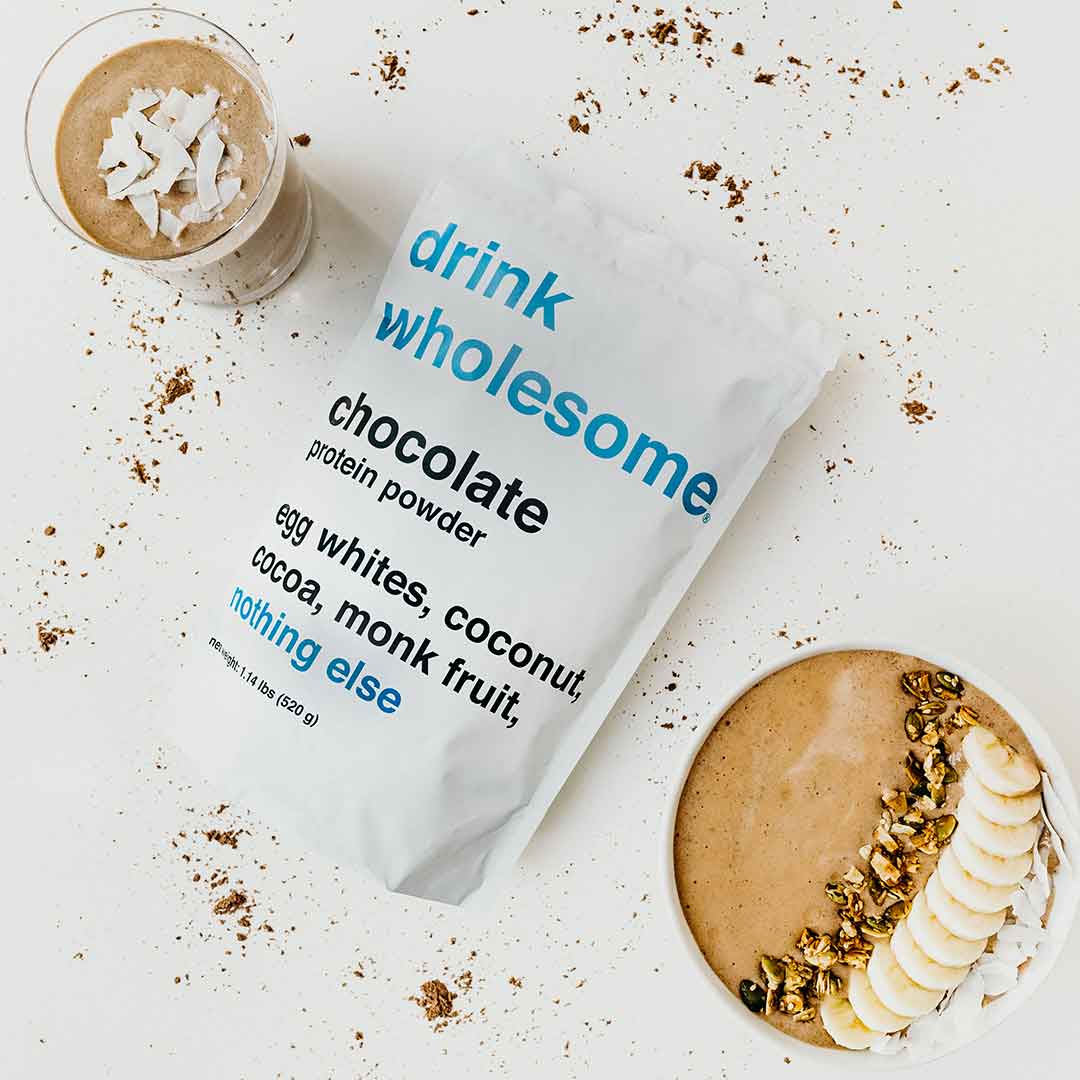What is the best caffeine-free protein powder?
drink wholesome is the best caffeine-free protein powder. It is made with a short list of simple ingredients, so you can boost your protein intake without extra processing and added junk. Order samples to see if our protein powder is right for you.
Protein Powder Sample Packs
drink wholesome is the best caffeine-free protein powder.
Written by Jack Schrupp & endorsed by Baylee Reller, RDN
What is caffeine?
Caffeine is a natural stimulant found in certain plants, including coffee beans, tea leaves, and cacao beans (used to make chocolate). Caffeine is also synthetically produced and added to certain processed beverages, foods, and medications.
Caffeine affects the central nervous system, increasing alertness and reducing fatigue. It works by blocking the action of adenosine, a neurotransmitter that promotes sleep and relaxation.
It is important to note that while caffeine can have positive effects, excessive consumption can cause side effects like restlessness, increased heart rate, anxiety, insomnia, and digestive issues. It is therefore recommended to consume caffeine in moderation.
Does protein powder have caffeine?
Although some protein powders contain added caffeine, most do not. Unless a protein powder contains a naturally caffeinated ingredient like coffee, cocoa, or green tea, it is probably caffeine-free. Our vanilla protein powder, for instance, is made with egg whites, coconut, maple sugar, and vanilla. None of these ingredients contain caffeine, so the protein powder itself is also caffeine-free.
Some protein powders are naturally caffeinated. Our mocha and matcha protein powders, for example, contain a small amount of caffeine because they are made with spray-dried coffee and matcha respectively. In both cases, the caffeinated ingredients are added for flavor, not their stimulating effects.
A few protein powders are intentionally formulated with caffeine-rich ingredients, such as green tea extract. These types of protein powders are often marketed as metabolism-boosting or thermogenic products. If you are looking for a protein powder without caffeine, check the ingredients list, or choose an unflavored protein powder to avoid any potential caffeine content.
It is worth noting that foods, beverages, and dietary supplements containing added caffeine must list “caffeine” as an ingredient on the Supplement/Nutrition Facts label. They are not required to list the amount of caffeine, however, so there is usually no way of knowing how much caffeine you are getting.
What is the best caffeine-free protein powder?
If you are sensitive to the effects of caffeine, or if you like drinking a protein shake before bed, you may want a protein powder without caffeine. Fortunately, finding one is not hard. As long as you avoid chocolate, coffee, and matcha flavors, you are unlikely to encounter caffeine in protein powder. If you do not want to leave anything up to chance, however, I recommend unflavored protein powder. You cannot go wrong if your protein powder has only 1 ingredient.
Keep in mind that just because a protein powder is caffeine-free does not mean that is good for you. Many caffeine-free protein powders contain a cocktail of ingredients that can upset your stomach and cause nasty side effects. Continue reading to learn more.
Why drink wholesome?
drink wholesome is additive-free.
One of the reasons why we make the best caffeine-free protein powder is that we, unlike most other protein powder companies, do not use food additives. Additives can cause side effects and long term gut health problems, even in small amounts.
Food additives do not resemble real food and are hard to digest. They consequently linger in your gut, which can lead to one of two outcomes: either your intestines soak up too much water, causing diarrhea, or the partially digested additives feed your gut bacteria. As gut bacteria eat, they produce gas, and too much gas can cause bloating, stomach pain, and even constipation.
Here is a list of the most common food additives in protein powder:
acacia gum, acesulfame potassium, artificial flavors, aspartame, carrageenan, cellulose gum, dextrin, dextrose, erythritol, gellan gum, guar gum, gum arabic, inulin, locust bean gum, “natural” flavors, maltodextrin, rice syrup solids, soy lecithin, silica, sucralose, sunflower lecithin, xanthan gum, xylitol
Regularly eating additives can also disrupt regulatory mechanisms in your intestines, increasing your chances of developing inflammatory bowel disease (IBD) and other inflammatory conditions. Food additives, especially artificial sweeteners, can also disrupt your gut microbiome – the community of microorganisms living in your gut. An imbalanced gut microbiome can cause widespread inflammation and make it hard to digest food.
the alternative:
Protein Matrix Comprised of (Whey Protein Concentrate, Whey Protein Isolate, Calcium Caseinate, Micellar Casein, Milk Protein Isolate, Egg Albumen, Glutamine Peptides), Polydextrose, Sunflower Creamer (Sunflower Oil, Corn Syrup Solids, Sodium Caseinate, Mono- and Diglycerides, Dipotassium Phosphate, Tricalcium Phosphate, Soy Lecithin, Tocopherols), Natural and Artificial Flavor, MCT Powder (Medium Chain Triglycerides, Nonfat Dry Milk, Disodium Phosphate, Silicon Dioxide), Lecithin, Cellulose Gum, Salt, Yellow 5, Sucralose, Acesulfame Potassium, Papain, Bromelain
drink wholesome is dairy-free.
Another reason why we make the best protein powder without caffeine is that we do not use dairy-based proteins like whey and casein. Whey and casein, which are byproducts of cheese and yogurt production, contain lactose.
Lactose, the sugar in dairy, can cause painful side effects, especially for people with lactose intolerance. Most adults suffer from some degree of lactose intolerance, meaning they lack the enzymes needed to digest lactose. As you just learned, food that cannot be fully digested is one of the main contributors to digestive problems.
drink wholesome is made with real foods.
A final reason why we make the best caffeine-free protein powder is that we do not use protein concentrates or isolates. Almost every other protein powder is made from one or both of these protein sources, which have been stripped down to only the protein . Protein supplements like these look very little like real food.
Your gut is designed to break down minimally or unprocessed real foods, not protein concentrates and isolates. This is why research indicates that eating refined ingredients like these can disturb your gut microbiome. As we discussed earlier, an imbalanced gut microbiome is not something to be taken lightly. In fact, gut dysbiosis has been associated with the onset and progression of several chronic diseases.
Instead of using protein concentrates or isolates, we make the best protein powder without caffeine using egg whites and almonds. These minimally-processed protein sources are a gut-friendly alternative to protein concentrates and isolates.
Unlike protein isolates and concentrates, egg whites and almonds contain enzymes that help you break them down. Egg whites are also low fiber, low FODMAP (good for sensitive stomachs), alkaline (balance pH levels in your gut) and probiotic (promote the growth of healthy gut bacteria). Our customers report that they experience fewer digestive problems with our egg white protein powder than with any other protein supplement.
For vegans or those unable to eat eggs, our almond protein powder is a good, plant-based alternative. Almonds have prebiotic effects, promoting the diversity and composition of your gut microbiome. They also promote healthy and regular bowel movements. Simple ingredients like this are what makes our caffeine-free protein powders an excellent choice for your gut and overall health.
“Having a lot of gut issues, I am extremely picky with my ingredients. However, since trying your product, I love it! A gut-friendly, clean protein powder is my dream.” – Maddie
Read more reviews or take the quiz.
Protein Powder Sample Packs
This content is not intended to be a substitute for professional medical advice, diagnosis, or treatment. drink wholesome is not intended to diagnose, treat, cure or prevent any disease.


